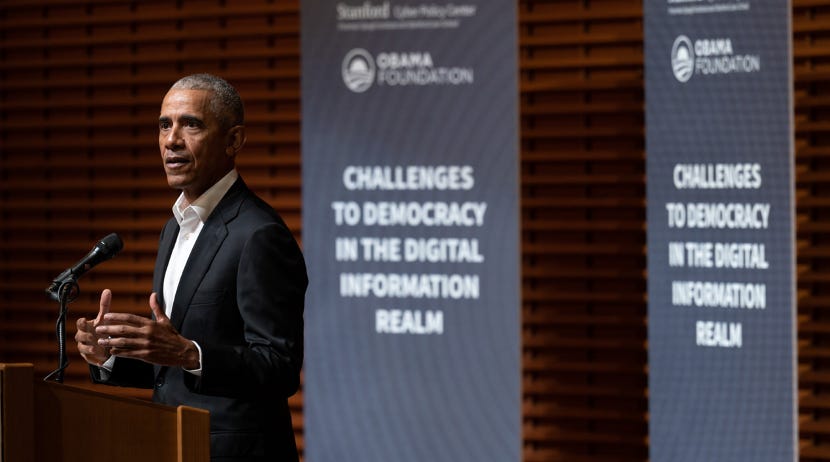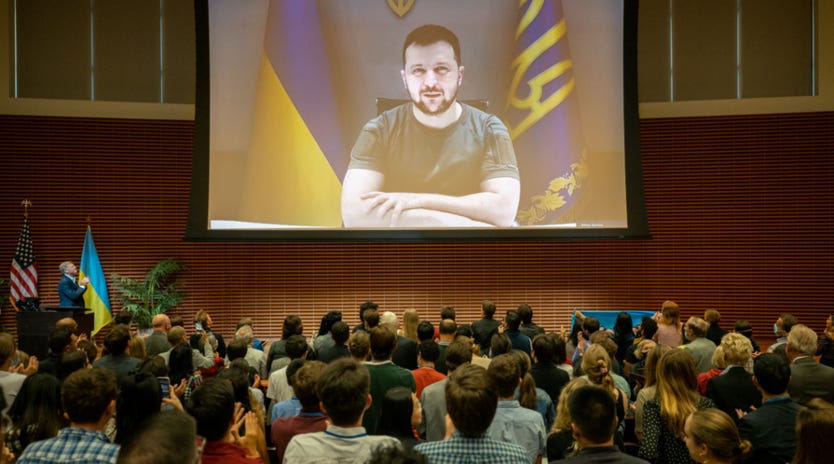McFaul’s World – 2022 Year in Review
2022 was both horrific and inspirational. Hoping for a more peaceful 2023
Since I left the government in 2014, I have been writing a monthly newsletter sharing my activities and publications, punctuated by a special end-of-year “year in review” edition. With a little over 24 hours to spare till 2023, I would like to share some key memories from 2022.
2022 was a tough one. This past year has been a tragic and challenging year for the world as well as for me personally. It will be forever remembered as the year in which, for the first time since 1945, major conventional warfare returned to Europe. Putin’s decision to invade Ukraine also reintroduced us to colonization, annexation, and threats of nuclear war – practices we thought were long in the past. Kidnapping, rape, looting, terrorist attacks on civilians, damaging of cultural sites, and purposeful destruction of key infrastructure, leaving thousands of Ukrainians without electricity, heating, and water, is how Russian soldiers fight in Ukraine today. This has shocked the world. It most certainly has shocked me. Having spent years living in Russia and decades admiring Russian culture and history, 2022 has compelled me to rethink many of my fundamental assumptions.
As many of you know, I have a day job at Stanford, running the Freeman Spogli Institute for International Studies (FSI), teaching courses in Political Science, participating in research and public policy activities at the Hoover Institution, and trying to finish my new book on Great Power Competition: Lessons from the Cold War for Competing with China and Russia in the 21st Century. Russia’s invasion of Ukraine, however, compelled me to alter and expand my portfolio of activities rather radically.
I tried to engage in the public policy debate about this war. Before Putin made the decision to invade, I proposed all sorts of ideas on how to try to avoid war, including this essay in Foreign Affairs, titled “How to Make a Deal With Putin: Only a Comprehensive Pact Can Avoid War.” Once Putin published his two draft treaties allegedly for peace and then told the world to take them or leave them, I knew he was not serious about negotiations. But I thought it was important to outline an alternative – a peaceful path – if Putin genuinely cared about pursuing proposals for enhancing Russian and European security. He did not.
Once Russia’s army invaded Ukraine, I believed that urgently providing military assistance to Ukraine to help stop Putin’s invasion was the most appropriate policy response for the United States and NATO. On television, radio, Twitter, and in print, I made countless arguments for why we needed to send more and better weapons to stop Putin’s destructive forces on the battlefield. I devoted most of the Washington Post columns to this topic, which you can read here. I had numerous opportunities to make these same arguments to many U.S. officials, including directly to President Biden and his senior national security team, Speaker Pelosi, and other members of Congress.
Advocating for more and better weapons for Ukraine was and is not enough. So, I also helped to start and coordinate an International Working Group on Russian Sanctions, also known as the Yermak-McFaul Expert Group as our team of experts from Ukraine, Europe, and the United States frequently consult with President Zelenskyy’s administration, headed by his Chief of Staff, Andrii Yermak. In addition, our group proposed ideas to and interacted with many governments in the global sanctions coalition. In ten months, we produced ten papers and lots of individual commentary, including ways to enhance the effectiveness of sanctions, using Russia’s assets to help rebuild Ukraine, and most recently a paper on how to implement a price cap on Russian oil. You can read them here.
I also leaned into helping explain the war to the American people, especially on MSNBC, and TV and radio audiences in Ukraine and Russia. I especially valued my interactions with Ukrainians on TV, via Zoom calls, or in one-on-one conversations, including a few with President Zelenskyy.
I especially valued connecting with dozens of our Ukrainian alums who had spent some time in our programs at FSI over the last two decades. Against all odds, these courageous people are fighting for their freedom and independence. My interactions with them on a constant basis throughout this horrible war have left me feeling inspired to do more to help Ukraine.
I did not have as much time as I would have liked to publish longer analytical explanations of this horrible war. Together with Professor Rob Person, I did publish “What Putin Fears Most” in the Journal of Democracy, which was the most-read online JOD article this year. To better understand what’s going on in Ukraine, you can watch my talk on the Causes and Consequences of Putin’s Invasion of Ukraine here. And for a more historical perspective, I chronicled the deeper origins of Putin’s animosity towards Ukraine and the West in From Cold War to Hot Peace: An American Ambassador in Putin’s Russia
At FSI, we also had a busy and productive year. You can read about everything we did here. Hosting my old boss, President Obama, in person at Stanford and President Zelenskyy via Zoom – his second speech at Stanford in two years – may have been the highlights for me.
And seeing alums from our training programs at Stanford share the Nobel Peace Prize was also very moving. The Nobel lecture delivered by Oleksandra Matviichuk, the head of Ukraine’s Centre for Civil Liberties and a fellow of our Ukrainian Emerging Leaders Program (UELP) in 2017-2018, was especially inspirational. Check it out here.
I continued to learn a ton from my Stanford colleagues and students. I especially learned a lot from teaching a new course on Social Mobilization and Democratic Breakthrough with Amr Hamzawy (syllabus here) and spending a week with a Hoover/Stanford delegation in Taiwan last August, which included meeting President Tsai!
This year, I also was especially honored to receive the State Award of Ukraine for Merit (3rd degree) from President Zelenskyy.
Finally, in December, I joined Substack. You can find my page here. Read about why I joined here in case you missed it last week. I plan to publish a few essays each week, both analytical and personal. Please subscribe! Access to the published pieces is free. I want to hear and learn from you. I especially look forward to using the platform to have ask-me-anything chats with my readers in the new year. Stay tuned for details.
Praying for all my Ukrainians suffering through his tragic, needless, and barbaric war, whose bravery I find deeply moving. And hoping 2023 will be more peaceful than 2022.
Chag Sameach, Merry Christmas, Happy Kwanzaa, and Happy New Year everyone!
Mike








I have hope for 2023 for end of the war in Ukraine and dread that the worst , nuclear war, could start and get out of control. So be alert in 2023 to all these possibilities. Thank you for your passionate witness.
Bob Langfelder
Excited about your book on Great Power Competition!